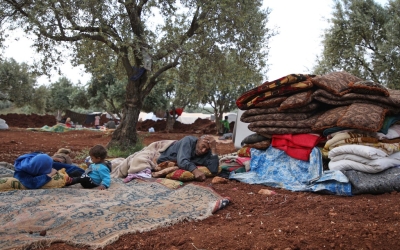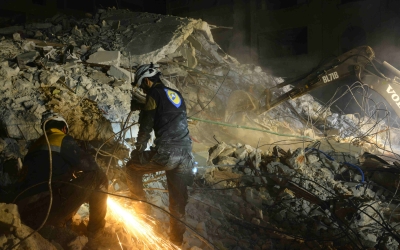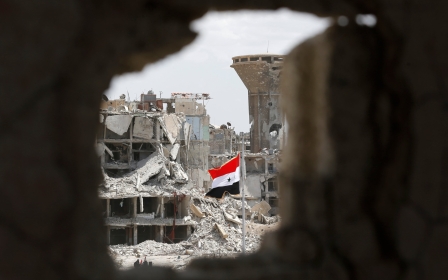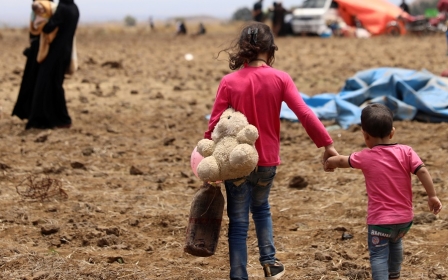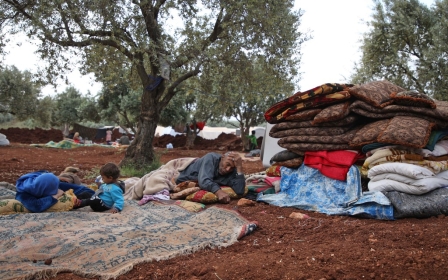A year in exile, Daraa's displaced watch hometowns descend into disorder
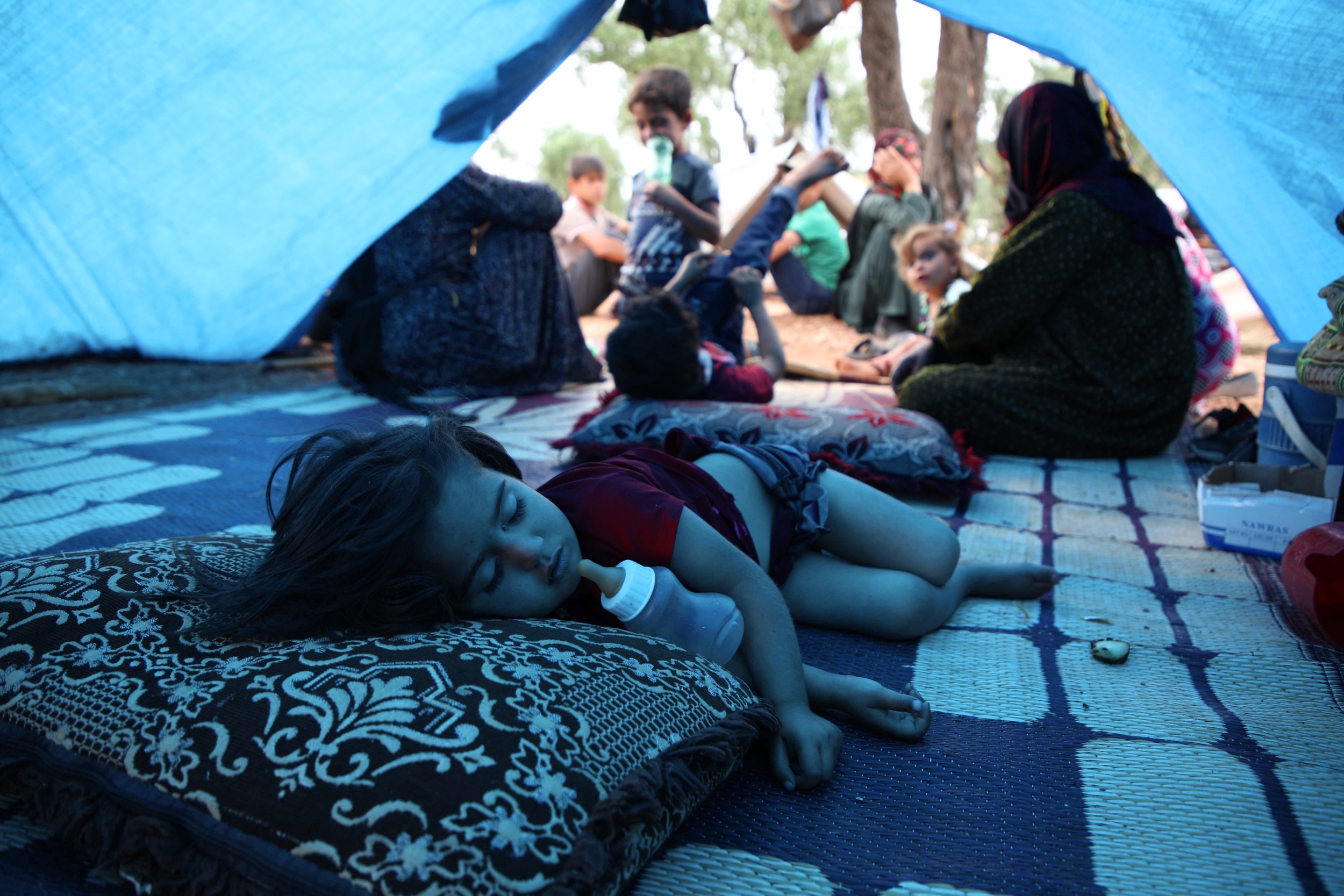
When Hoda's ageing father suffered a stroke last week, there was little she could do.
Anxious he would not get the care he needed in his hometown in Syria's rural Daraa province, where few doctors remain, she longed to be at his bedside. Hundreds of kilometres away in displacement, however, that was impossible.
Hoda's father recovered from the stroke, yet the family remains separated across a web of front lines and areas of control. Last week was the last time she managed to speak to him over the phone.
One year ago, Hoda's hometown in Daraa was the scene of a lightning military offensive by pro-government forces to retake the whole of the country's south from rebel control.
It was a weeks-long battle that saw the 43-year-old move from town to town seeking safety alongside her brother and his family, finally ending up as far as she could flee from oncoming government forces along the hilly borderline with the Israeli-occupied Golan Heights.
New MEE newsletter: Jerusalem Dispatch
Sign up to get the latest insights and analysis on Israel-Palestine, alongside Turkey Unpacked and other MEE newsletters
Hoda's 80-year-old father stayed behind in the family home with one of his daughters. He is simply too frail, and sickly, to travel easily, Hoda says.
Hoda had little choice but to leave him behind. She had already been detained and imprisoned by government security forces in the early years of the war, supposedly for providing "logistic support to the opposition," she says. She remained in detention for six months.
Staying behind under renewed government control could mean arrest, again, and the risk of disappearing into the government's widely feared network of prisons.
When the government organised bus convoys north from Daraa for fighters and civilians choosing to leave, she and her brother went along with them. The destination: rebel-held Idlib, long an end point for forcible evacuations from other formerly rebel-held pockets of Syria.
"I didn't feel like I could trust the regime," Hoda says, referring to a series of reconciliation deals the Syrian government carried out in former opposition-controlled towns across Daraa last year.
Now one year later, she only communicates with her father by phone, usually once every day or two. Visiting him is a distant dream, says Hoda.
"I can't go back."
Daraa's shaky reconciliation
Daraa has long been known among Syrians as the "cradle" of the country's revolution. It was there that popular protests broke out in 2011 following the arrest and brutal torture of more than a dozen teenagers accused of scrawling anti-government graffiti on a school wall.
The following years saw rebel forces take control of Daraa while an emerging sector of citizen journalists and media activists documented events. There were aerial bombardments, battles and mass waves of displacement.
More than eight years later, however, the rural province is under renewed, yet shaky government control.
A series of patchwork surrender-and-reconciliation agreements saw thousands of fighters and residents board government buses.
Like former residents of the Damascus suburbs and east Aleppo city, those who left now eke out a life in internal exile in the northwest, often unemployed and with few friends from home nearby.
But Daraa was unique. Unlike in places such as the Damascus suburbs of Eastern Ghouta and Daraya, many former rebel commanders were allowed to stay home rather than board the evacuation buses, negotiating deals with the Syrian government and its Russian allies to maintain relative autonomy in some towns and villages.
The result is a complex web of political control in Syria's south, with restricted movement and, like elsewhere retaken by the government, communication tightly monitored.
That uneasy peace has been fraying for months. Gunmen have attacked checkpoints and other government installations, and targeted local political figures for assassination. Former residents who still speak with relatives inside Daraa say arrests are widespread. The violence has only grown in recent months.
Watching home from afar
Those in exile in Syria's northwest can do little but watch from afar.
They only communicate sporadically with family and friends who stayed behind in Daraa - getting caught by the government's security forces speaking to people in the opposition-held north could mean arrest, former residents now living in Idlib tell Middle East Eye.
Ahmad al-Hiraki works as an accountant with the Civil Defence, a rescue group commonly known as the White Helmets active in opposition-held areas of Syria.
He left his hometown in rural Daraa province one year ago, eventually settling in the town of Ariha near Idlib city. Ahmad rarely speaks with his sister, who still lives in their hometown, for fear she could the garner attention of security forces.
When he does reach out to his sister to check in on her, Ahmad messages her from his wife's mobile phone rather than his own - his phone number could be flagged by government authorities due to his work for the Civil Defence, he says.
"We speak over WhatsApp, but without sending voice messages - just text messages," Ahmad says. "Voice messages are under surveillance by the regime."
What little he does hear of home is unsettling.
Widespread arrests. House raids in the middle of the night. Drive-by assassinations. Dead bodies, including those of his own relatives, dumped outside their homes. Late last month, unknown assailants blew up a government building just outside his hometown.
There is a state of fear. Anyone can come and take you-there is no safety
- Ahmad al-Hiraki
Elsewhere in Ariha, 43-year-old father Marwan says he stops himself short of asking about the growing unrest back home in Daraa. Though he came north with his wife and four children last year, he still has close relatives in the south, and worries for their safety.
"We don't ever talk politics [with family members back home]," says Marwan. He requested a pseudonym for security reasons.
"A week ago, I spoke to my nephew. It was all just 'how are you?' and 'how is your health?'" Marwan tells Middle East Eye.
"That's it."
Under renewed bombs
Idlib province, where most of Daraa's exiled residents ended up, now remains the last major pocket of rebel control after several years of pro-government military advances.
Today, they are living on the front lines of yet another battle.
Idlib is home to an estimated three million Syrians, roughly half of them internally displaced from areas of the country once under rebel control.
But now the northwestern province and parts of neighbouring rural Aleppo, Hama and Latakia are facing the prospect of being the site of the next major military showdown between opposition and pro-government forces.
A deal brokered by Russia and Turkey late last year in the Russian resort city of Sochi held off a massive pro-government assault on northwestern Syria for a time, though now it's largely irrelevant as Syrian government and Russian forces pummel the region with bombs.
The onslaught has brought life to a standstill in Idlib, former Daraa residents say. In Daraa, Ahmad remembers living as part of a community, among neighbours who looked out for one another and spent time together. The local shopkeepers all knew him by name.
"Here, we don't know anyone," he says. The danger of air strikes, as well as his demanding work schedule as an accountant, keeps him from meeting his neighbours. The only people he now spends time with outside work and home are a sister, who also lives in Ariha, and her family.
Even when they do gather, it's rare that they speak of anything other than the war and the bombing now threatening them yet again in exile.
Most recently, he says, the conversation has turned darker. Earlier this month, two people from the family's hometown in rural Daraa were killed under bombs in Idlib, Ahmad says. They were rattled by the news.
Still, "I'd rather live under bombs [in Idlib] than be vulnerable to arrest in Daraa," says Ahmad. He questions whether he would ever be able to live at home again in his village, nestled among what was once quiet farmland in Syria's southwest.
"I feel as if I'll never return."
Middle East Eye delivers independent and unrivalled coverage and analysis of the Middle East, North Africa and beyond. To learn more about republishing this content and the associated fees, please fill out this form. More about MEE can be found here.


